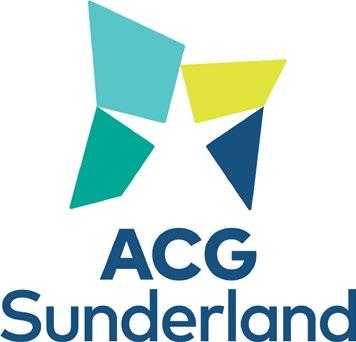College Option Guide 2024 ACG Sunderland College





ACG Sunderland College is separated into two: the “Lower College” consisting of Years Seven to Ten and the “Upper College” made up of Years Eleven to Thirteen students. There is a seamless transition of learning between the two due to the nature of our specialisation.
ACG Sunderland Staff recognise that each academic year has distinct developmental needs and teaching programmes reflect these requirements. Students are taught by highly qualified and successful teachers who are specialists in their curriculum field. Our core business is Teaching and Learning but we recognise that students must have a balanced, holistic experience while at ACG Sunderland. Sports, culture, music and leadership opportunities are co-curriculum activities that all our students are encouraged to participate in.
The vision for ACG Sunderland College is a state-ofthe-art, twenty-first century learning environment with a traditional heart and soul that connects with, and fosters a community spirit.
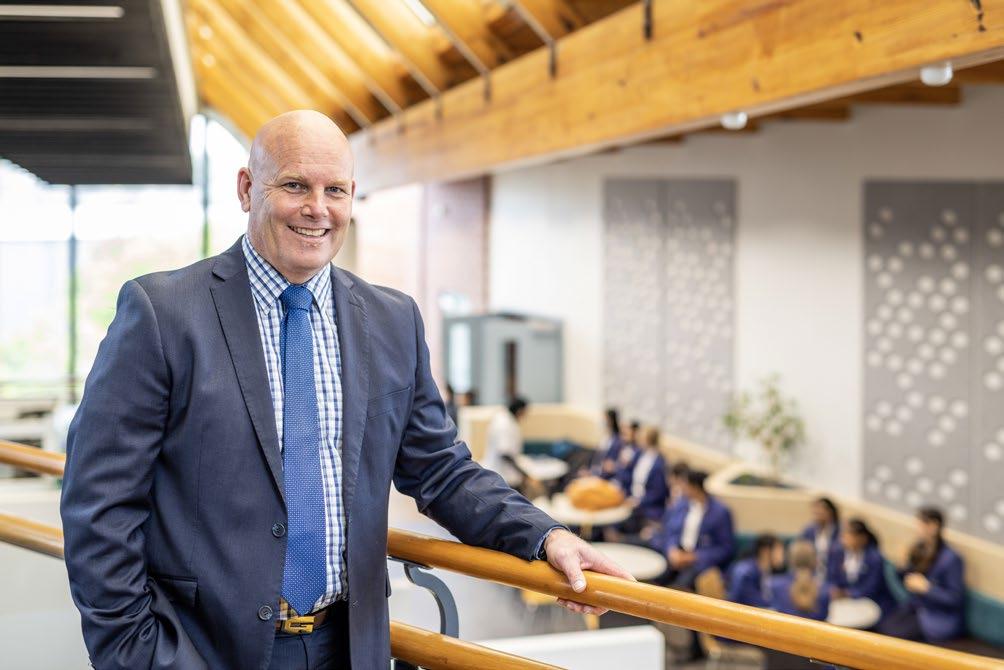
Progress and tradition are the cornerstones of this vision which has six key aspects:
• Offering an international qualification with a quality assessment system:
• An atmosphere where students enjoy coming to school
• A supportive environment for staff
• High involvement in co-curricular activities
• Service and personal development will be fostered
• Provide an Education of Excellence
At ACG Sunderland we aim to prepare your child for a lifetime of learning by providing students with the necessary academic, sporting, cultural and life skills that will ensure that they are balanced and independent citizens of the future.
Nathan Villars Campus PrincipalAll essential learning areas are covered to create a broad and balanced curriculum:
English
Spanish (Language)
Mathematics Science
Social Sciences
The Arts
Physical Education
Technology
Computer Science
Year 11 students will sit the Cambridge International Examinations (IGCSE) in the following subjects:
English Mathematics Plus, options of:
Art & Design
Computer Science
Science:
• Physics
• Chemistry
• Biology
Design Technology History
Music
Physical Education
Spanish
Year 12 students will sit the Cambridge International Examinations (AS) in the following subjects:
English Literature OR
English Language OR
English General Paper
Plus, options of:
Art & Design
Biology
Business Chemistry
Classical Studies
Computer Science
Design Technology
Marine Science
Mathematics
Music Physics
Physical Education
Spanish
With continued growth, additional subjects will be offered in future years.
Year 13 students will sit the Cambridge International Examinations (AS or A2) in the following subjects:
Options of:
Art & Design
Biology
Business Chemistry
Classical Studies
Computer Science
Design Technology
English Literature
English
General Paper
English Language
Marine Science
Mathematics
Music Physics
Physical Education
Spanish
Students in Years Seven and Eight belong to ACG Sunderland’s Lower College. An extensive and challenging academic curriculum is offered alongside co-curricular activities to enhance skills that will lead to lifelong learning.

The welfare and care of our students is of paramount importance. An integral part of ACG Sunderland’s pastoral care is the House System which fosters a sense of belonging to encourage each student to contribute to ACG Sunderland. Year Seven is the transition year from Primary to College and at ACG Sunderland they will be cared for in a horizontal Form Class. All other year levels operate in the ACG Sunderland vertical forms.
Most Lower College subjects follow the Cambridge Lower Secondary curricula as this provides the best foundation to move into the Cambridge Upper Secondary and Cambridge Advanced curricula used in the Upper College.
Students are taught by highly qualified and successful teachers who are specialists in their curriculum field. Students sit a core curriculum comprising of:
• English
• Mathematics
• Science
• Social Sciences
• Physical Education
• Music
• Drama & Public Speaking
• Art & Design
• Spanish
• Design & Technology
• Computer Science
Students will sit two sets of school examinations during the year for all subjects studied. The first in May on the material from the first half of the year and the second in late October on material taught in the second half of the year. Students will be taught examination and study skills within their form classes to properly prepare them to sit these examinations. The school examinations within the Lower College are important preparation for success in the Upper College within the Cambridge Examination system.
Throughout our College the use of technology and information access is encouraged, whilst ensuring that the key skills of literacy and numeracy are reinforced at all times. A strong foundation is given to the students by specialist teaching that ensures a seamless transition into the Upper College years.
High expectations in work standards are also required throughout all student activities.
Students in Year Nine belong to ACG Sunderland’s Lower College. An extensive and challenging academic curriculum is offered alongside co-curricular activities to enhance skills that will lead to lifelong learning.

The welfare and care of our students is of paramount importance. An integral part of ACG Sunderland’s pastoral care is the House System which fosters a sense of belonging to encourage each student to contribute to ACG Sunderland. Year Nine students form part of the Sunderland vertical forms. Their pastoral care is looked after by the same form teacher for the duration of their time at the college.
Most Lower College subjects follow the Cambridge Lower Secondary curricula as this provides the best foundation to move into the Cambridge Upper Secondary and Cambridge Advanced curricula used in the Upper College. Students will sit Cambridge Checkpoint examinations in Term Four of their Year Nine academic year.
Students are taught by highly qualified and successful teachers who are specialists in their curriculum field. Students sit a core curriculum comprising of:
• English
• Mathematics
• Science
• Social Sciences
• Physical Education
• Music
• Drama & Public Speaking
• Art & Design
• Spanish
• Design & Technology
• Computer Science
Students will sit two sets of school examinations during the year for all subjects studied. The first, in May, on the material from the first half of the year and the second, in late October, on material taught in the second half of the year. Students will be taught examination and study skills within their form classes to properly prepare them to sit these examinations. The school examinations within the Lower College are important preparation for success in the Upper College within the Cambridge system.
Year Nine students will also sit the external Cambridge Lower Secondary Checkpoint examinations at the end of the Lower Secondary programme in October. Students will complete an examination for the following subjects English, or English as a Second Language, Mathematics and Science.
Throughout our College the use of technology and information access is encouraged, whilst ensuring that the key skills of literacy and numeracy are reinforced at all times. A strong foundation is given to the students by specialist teaching that ensures a seamless transition into the Upper College years.
High expectations in work standards are also required throughout all student activities.
Students in Year Ten form the final year of ACG Sunderland’s Lower College. An extensive and challenging academic curriculum is offered alongside co-curricular activities to enhance skills that will lead to lifelong learning.
The welfare and care of our students is of paramount importance. An integral part of ACG Sunderland’s pastoral care is the House System which fosters a sense of belonging to encourage each student to contribute to ACG Sunderland. Year Ten students form part of the Sunderland vertical forms. Their pastoral care is looked after by the same form teacher for the duration of their time at the college.
The Year Ten academic courses are written to give students the best possible preparation to move forward into the Cambridge Upper Secondary and Cambridge Advanced curricula used in the Upper College. In English, Mathematics and Science the formal teaching of the IGCSE course will begin. In other subjects some IGCSE content will be delivered but more importantly the students will be prepared in the skills and thinking required to succeed in IGCSE courses in the future.
Students are taught by highly qualified and successful teachers who are specialists in their curriculum field. Students sit a core curriculum comprising of:
• English
• Mathematics
• Science
• Social Sciences
• Physical Education
• Music
• Art & Design
• Spanish
• Design & Technology
• Computer Science
Some talented students will be offered the opportunity to sit IGCSE Combined Science during Year Ten. With excellent results these students could continue on to IGCSE Single Sciences during their Year Eleven year.
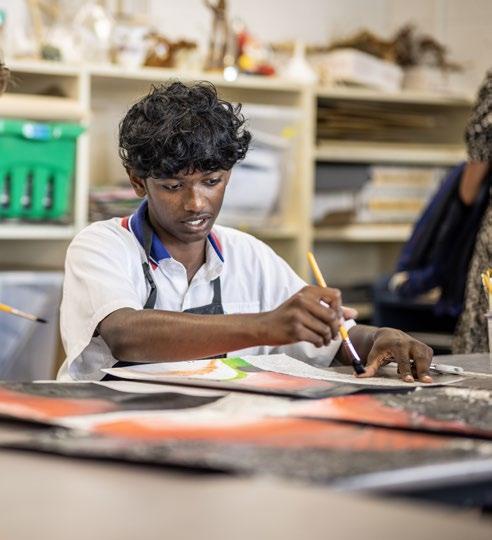
Students will sit two sets of school examinations during the year for all subjects studied. The first in May on the material from the first half of the year and the second in late October on the whole year’s material. This will be the students’ first experience of an examination on the whole year’s work as they prepare the move to the Upper College. Students will be taught examination and study skills within their form classes to properly prepare them to sit these examinations. The school examinations within the Lower College are important preparation for success in the Upper College within the Cambridge system.
Throughout our College the use of technology and information access is encouraged, whilst ensuring that the key skills of literacy and numeracy are reinforced at all times. A strong foundation is given to the students by specialist teaching that ensures a seamless transition into the Upper College years.
High expectations in work standards are also required throughout all student activities.
Students in Year Eleven move into ACG Sunderland’s Upper College. Students are encouraged to study subjects that best suit their interests, ability and future aspirations. Individual guidance is given for subject selection throughout the College. High academic expectations, small class sizes and the close monitoring of performance promotes sound academic success. University and career information will be available to all students.
The welfare and care of our students is of paramount importance. An integral part of ACG Sunderland’s pastoral care is the House System which fosters a sense of belonging to encourage each student to contribute to ACG Sunderland. Year Eleven students form part of the Sunderland vertical forms. Their pastoral care is looked after by the same form teacher for the duration of their time at the college. As members of the Upper College, Year Eleven students will begin to be offered leadership opportunities and will be expected to undertake a senior role within the form class.
In order to ensure that students have a broad-based course, a core programme operates. Students will be required to study the following subjects:
• English
• Mathematics
Students will study both English Language and English Literature courses continuing the teaching started in Year Ten. Mathematics forms an essential part of the course of study, a D pass in the IGCSE examination is required to fulfil the numeracy requirement for university entrance.


In addition to the compulsory subjects, students should select THREE optional subjects from the subjects listed below. The subjects available will provide students with an excellent background for A-Level study in future years.
• Art & Design
• Computer Science
• Science (Biology, Chemistry, Physics)
• Design & Technology
• History
• Music
• Physical Education
• Spanish
Students in Year Twelve belong to ACG Sunderland’s Upper College. Students are encouraged to study subjects that best suit their interests, ability and future aspirations. Individual guidance is given for subject selection throughout the College. High academic expectations, small class sizes and the close monitoring of performance promotes sound academic success. University and career information will be available for all students.
The welfare and care of our students is of paramount importance. An integral part of ACG Sunderland’s pastoral care is the House System which fosters a sense of belonging to encourage each student to contribute to ACG Sunderland. Year Twelve students form part of the ACG Sunderland vertical forms. Their pastoral care is looked after by the same form teacher for the duration of their time at the college. As members of the Upper College, Year Twelve students will be offered leadership opportunities and will be expected to undertake a senior role within the form class and the school as a whole.
At Year Twelve students have far more flexibility over their course and are encouraged to select subjects that build towards their goals for after they graduate from the College. Students will be required to study at least one of the following subjects:

• English Language, English General Paper or English Literature
Students will study English Language or English Literature; an E pass in the AS Level examination is required to fulfil the literacy requirement for university entrance. Any students who do not gain at least a D grade in IGCSE Mathematics will be required to repeat that course in order to achieve the numeracy standard for university entrance.
In addition to the one compulsory subject, students should select THREE optional subjects from the AS Level subjects listed below.
• Art & Design
• Biology
• Business
• Chemistry
• Classical Studies
• Computer Science
• Design & Technology
• English Language
• English Literature
• English General Paper
• Marine Science
• Mathematics
• Music
• Physical Education
• Physics
• Spanish
Students wishing to study a subject at AS Level will need a good grade at a lower level of the subject to complete the course successfully, the grade required is listed in the latter part of this booklet.
The level required will depend on the subject and students will be supported to make appropriate subject choices that will give them the best chance of success.
Students in Year Thirteen belong to ACG Sunderland’s Upper College. Students are encouraged to study subjects that best suit their interests, ability and future aspirations. Individual guidance is given for subject selection throughout the College. High academic expectations, small class sizes and the close monitoring of performance promotes sound academic success. University and career information will be available for all students.
The welfare and care of our students is of paramount importance. An integral part of ACG Sunderland’s pastoral care is the House System which fosters a sense of belonging to encourage each student to contribute to ACG Sunderland. Year Thirteen students form part of the ACG Sunderland vertical forms, their pastoral care having been looked after by the same form teacher for the duration of their time at the college. As the senior members of the Upper College, Year Thirteen students will be offered leadership opportunities and will be expected to undertake a senior role within the form class and the school as a whole.
In Year Thirteen students should select FOUR Subjects. These can be at IGCSE, AS or A2 level. There are no compulsory subjects at Year Thirteen (as long as students have met the numeracy and literacy standard for university entrance).

This means that students will need to select a subject that;
• they have taken at IGCSE level and study it at AS level or
• that does not require study at IGSCE level to gain entry to an AS or
• at IGCSE level they have not studied before.
The options that are expected to be available in 2024 are:
Art & Design
Biology
Business
Chemistry
Classical Studies
Computer Science
Design & Technology
History
English Language
English General Paper
English Literature
Marine Science
Mathematics
Music
Physics
Qualification
IGCSE, AS and A2
AS and A2
AS and A2
AS and A2
AS and A2
IGCSE, AS and A2
IGCSE, AS and A2
IGCSE
IGCSE, AS and A2
AS
IGCSE, AS and A2
AS and A2
IGCSE, AS and A2
IGCSE, AS and A2
AS and A2
Please note that all subjects are offered subject to sufficient students choosing the course. Additional subjects will be considered and will be made available in future years.
Physical Education
Spanish
IGCSE and AS
IGCSE, AS and A2

Cambridge courses gives students an opportunity to have a wide range of subjects and an advanced course of study. Students should check tertiary courses they wish to enter for subject requirements and ensure they are selecting the subjects they need. All students will be individually counselled to ensure they are making good subject decisions.
These are administered by the Cambridge Assessment International Education. Although this organisation is based in the United Kingdom, its courses are designed for the international community. Thus, syllabi are designed for the needs of the countries entering the awards. In some cases this means their content is similar to syllabi in the UK, but in other subjects the content is very different.
The structure of the Cambridge awards is the same as the UK awards with two main levels:
IGCSE (International General Certificate of Secondary Education) is usually taken at Year Eleven.
A Levels are completed over two years. More recently, AS Level was introduced as half an A Level award. This means that you will usually sit AS examinations in Year Twelve and sit a combination of AS and A2 examinations in Year Thirteen to complete an A-Level qualification. (AS plus A2 is the same as an A Level.)
Cambridge Examinations are sat by students in over 9000 schools in more than one hundred and sixty countries.
In some IGCSE subjects there are two course levels – Core Curriculum and Extended Curriculum. The Extended Curriculum offers a more challenging course and represents the standard course delivered at ACG Sunderland. We only offer the core curriculum as an option in IGCSE Mathematics.
Students who sit an Extended examination can gain A*, A, B, C, D or E Grades.
Students who sit a Core examination can gain C, D, E, F or G Grades.
At AS, A2 and A Level the grades awarded are A, B, C, D or E. Marks below these are ungraded. (An E Grade equates approximately to marks of between 40% and 49%). A* Grades are now available to distinguish top candidates in full A-Levels only, 90% to 100% is needed to obtain these.
Cambridge Examinations are held in October-November each year.
Students in the Upper College will sit mid-year (Term Two) and end of year (Term Three) ‘practice’ or ‘mock’ examinations. These will form a part of the ACG Sunderland assessment system.
Cambridge qualifications are accepted by all of the tertiary institutes and universities in New Zealand. They are also accepted at every English speaking university worldwide and many of the non-English speaking universities. In the United States and Canada good grades at A-Level can result in up to one full year of university study being credited – this includes Ivy League Universities.
The minimum requirements for entry to a New Zealand university are:
• That in order to qualify for university entrance Cambridge candidates presenting A or AS levels, must gain a minimum of 120 Tariff points and a minimum grade of D in each of at least three AS Level subjects (Thinking Skills and the General Paper are excluded)
• That a Cambridge candidate presenting an E grade or better in AS English and a D grade or better in IGCSE Mathematics will be deemed to have satisfied the literacy and numeracy requirements of the university entrance standard
• A tariff score is calculated over a maximum of six subject units in subjects at AS, A2 or A-Level from subjects that contribute to University Entrance (Thinking Skills and the General Paper are excluded). This tariff score will be used to determine entry to restricted entry courses, requirements for this will be published each year by individual universities
Overseas universities will each have their own entrance requirements, these can be found on their websites. Mr Robson Mrs Lambarth, or Mr Keen can help with advice, finding requirements and assisting with applications to overseas universities.
• An A-Level counts as two subject units
• Where a student has studied more than six subjects only the best six scores will be used
• A* grades are only available in a full A-Level, not in an AS Level course
Currently the entry fees charged for Cambridge International Examinations by ACG Sunderland are:
Checkpoint
• Cambridge Primary Checkpoint = NZ$70 per subject.
• Cambridge Lower Secondary = NZ$90 per subject

IGCSE
• NZ$188 per subject
• An additional fee of $140.00 fee for all students taking Art and Design examinations.
AS/A Level
• Fee of NZ$198 per subject
• For students taking a full A-Level in one session a fee of NZ$278 will be charged.
• An additional fee of $140.00 fee for all taking Art and Design examinations.
Note: There is an expectation that those students selected for Cambridge qualification subjects will enter the Cambridge examinations in all subjects at the appropriate level.
In Years Seven to Ten the course is already set for each student giving them a broad-based course to prepare them well for study in future years.
At Year Eleven, a student’s academic programme should continue to be broad-based so that they can keep their choices open at higher levels. This is why there are compulsory subjects. Students can also study some subjects that interest them or will lead towards desired paths of study.
It is important that a student’s course at IGCSE level is broad-based so that they have a number of different options for the future. Students will start to specialise more in Year Twelve and this will be continued with greater depth in their final year of studies.
Not everyone knows what they want to do when they leave school, but it is time to start thinking about some of the options that students may wish to consider. This may help them make their choices. However, if they maintain a broad course, this should give them many options in the future.
To gain University Entrance, students will need to meet certain entry standards. While most of these will be achieved in Years Twelve and Thirteen, it is important to realise that minimum levels of literacy (in English) and numeracy (in Mathematics) will be required.
At Years Twelve and Thirteen, students can either continue with subjects studied earlier or can choose to add some new ones. At this level a student’s academic programme should look to the future and include subjects that they think they will need for higher levels of study. There should still be opportunities to include subjects that reflect a student’s strengths or that they will enjoy.
For New Zealand universities the level of numeracy has been defined as a D Grade or better in IGCSE Mathematics. The literacy level is an E grade or better in AS English (either Language or Literature). For the University of Auckland only a D grade in AS English (either Language or Literature) will be required for direct entry. Those who come in with only an E grade in AS English will still be accepted but will need to do an English paper during Stage One.
If students want more information about Cambridge examinations they can get assistance from Mr Robson, Mrs Lambarth or Mr Keen.
They can also find out more about these examinations from the Cambridge website at:
http://www.cambridgeinternational.org/
What is the best advice when choosing my subjects?
For IGCSE, students should select a broad range of subjects, and make sure that you pick subjects that you are good at and enjoy. For AS and A2 Level, you should look at university entry requirements as some courses have subject-specific requirements. If you are unsure of where you are headed, then you should pick subjects that allow for a number of different career options and pathways in the future.
How many subjects do I have to take in Year 11? Year 12 Year 13? Are there compulsory subjects?
In Year 11 students sit IGCSEs, you must take English (Literature & Language) and Mathematics. You then have three further choices. These include Art, Computer Science, Design & Technology, History, Music, Physical Education, Science (Physics, Chemistry & Biology) & Spanish.
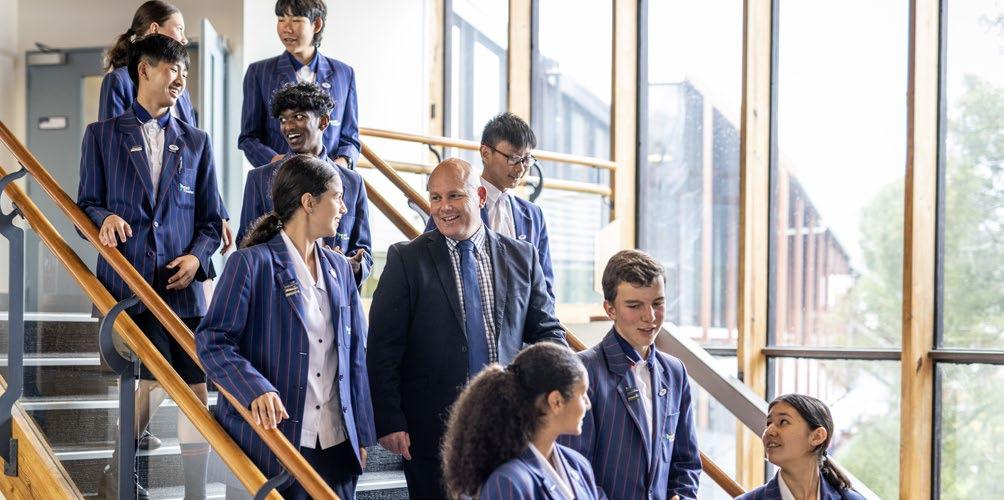
In Year 12 students choose four AS courses. You must take either English Literature, English Language or English General Paper. You then make three other choices from Art, Biology, Business, Chemistry, Classical Studies, Computer Science, Design & Technology, Marine Science, Music, Physical Education, Physics & Spanish.
In Year 13 Students choose four courses. These are most usually a combination of AS and A2 levels. As long as students have gained their University Entrance (UE) Numeracy and Literacy requirements for their chosen universities, students can choose any four subjects.
Do I have to take Science at IGCSE?
All students are examined in Science at Checkpoint in Year 9, but they do not have to take Science at IGCSE level. Students should select a broad base of subject options.
Can I elect to choose five subjects in Year 12 or Year 13?
On a case-by-case basis, some students who have a proven record of excelling at IGCSE/AS level (A*/A grades) may be permitted to choose five subjects after consultation and approval with Mr Keen or Mr Robson.
Who do I speak to if I have questions about a subject/course?
You should speak directly to the subject teacher and/or Faculty Coordinator.
Which subjects have internally marked coursework requirements? Should I take all coursework-based subjects?
Subjects that have coursework requirements are Art, Design & Technology, Music, Physical Education and Spanish. It is recommended that you consider your style of learning when choosing coursework-based subjects.
Are there prerequisites for subjects?
There is an open entry policy for IGCSE however we recommend you choose subjects that you are interested in and good at. For entry to an AS Level course, students should have obtained a C grade or higher at IGCSE. For entry to an A2 Level course, students should have obtained a D grade or higher at the AS Level.
What happens if I do not meet the subject prerequisite?
If you do not meet these requirements, please first discuss with the Faculty Coordinator to seek their advice. Final academic programs will be subject to approval by Mr Keen and Mr Robson. Decisions will be handled on a case-by-case basis.
What happens if I don’t pass IGCSE Mathematics?
Students will need to re-sit IGCSE Mathematics in Year 12 as it is required for University Entrance Numeracy in New Zealand.
What happens if I don’t get an E grade or higher in AS English?
Year 13 students will need to re-sit as a pass in an AS English course is required for University Entrance Literacy in New Zealand.
What do I do if I didn’t get the AS grade I expected/ worked towards?
There are a variety of options available including a review of your exam script; resitting the AS class; or self-studying and resitting in October of Year 13. Please discuss these on the Tutor Days with Mr Keen or Mr Robson.
What should I do if I want to change my subject options?
Once you have your results in January, please first discuss any potential changes with your parents/ guardians as their consent is required. You should then speak with Mr Keen or Mr Robson during the Tutor Days that are immediately before the start of Term 1. Please note that it is important to chose wisely now as the College timetable and staffing is made based on the option data collected in Term Three.
The College’s expectation is, to prevent loss of teaching time in Year 13, resits are in October. Applications for resitting AS levels need to be made at the beginning of the year. You are advised to consider carefully your workload, timetable, and the grade received.



Art and Design helps to develop critical thinking and the ability to interpret the world around us and the world within us. Learning through the Arts is an enriching experience that offers valuable opportunities for students while at school and beyond. Art and Design encourage self-expression and can build confidence as well as a sense of individual identity. Creativity can also help with wellbeing and improving health and happiness. The Arts-related industries are a popular career choice. Many companies value imagination, conceptual thinking, powers of observation and analytical ability. If you love Art and Design, making things, thinking outside the box, and prefer coursework to examinations, you should consider choosing Art and Design.
Work should evolve through personal investigation and development. Responses will be based on directly observed startwing points or subject. Students are encouraged to work independently and explore a wide range of creative media.
Assessment
Assessment Component 1 Coursework 50%. Externally assessed. There are two parts to the coursework:
• A portfolio and
• A final outcome.
Component 2 - Externally Set Assignment 50%. Externally assessed.
There are two parts of the assignment:
• Supporting studies, created during the presentation period and
• A final outcome, produced during a supervised 8-hour examination
Teacher in Charge: Tammy Rubin
BFA, PGDip Teaching Secondary Tammy.Rubin@acgedu.com
Students will require a C grade in IGCSE level Art & Design.

Students will explore directly observed objects or subjects relating to a theme, concept or issue, by recording visual and/or other appropriate research to show clear evidence of the development of ideas. They should display knowledge from other cultures, historical contexts and local crafts, as well as familiarity with a broad range of fine artists that they can relate to their own studies. Students will explore the use of tone, colour, composition, materials and context.
Assessment
Assessment Component 1 Coursework. Externally assessed. There are two parts to the coursework:
• A portfolio and
• A final outcome.
50% of the AS level, 25% of the A-level
Component 2 - Externally Set Assignment Externally assessed.
There are two parts of the assignment:
• Supporting studies, created during the presentation period and
• A final outcome, produced during a supervised 15-hour examination.
50% of the AS level, 25% of the A-level.
“Art and Design has taught me to express myself and explore different ideas using visual languages whilst developing a deeper understanding of the importance of art and graphics in the world today.”
Requirements
Students will require a D grade in AS level Art & Design.

Students investigate a theme, idea, concept or process that is personal to them.
Students select work that best demonstrates their ability to carry out independent research from a starting point of choice through to a fully realised and coherent conclusion.
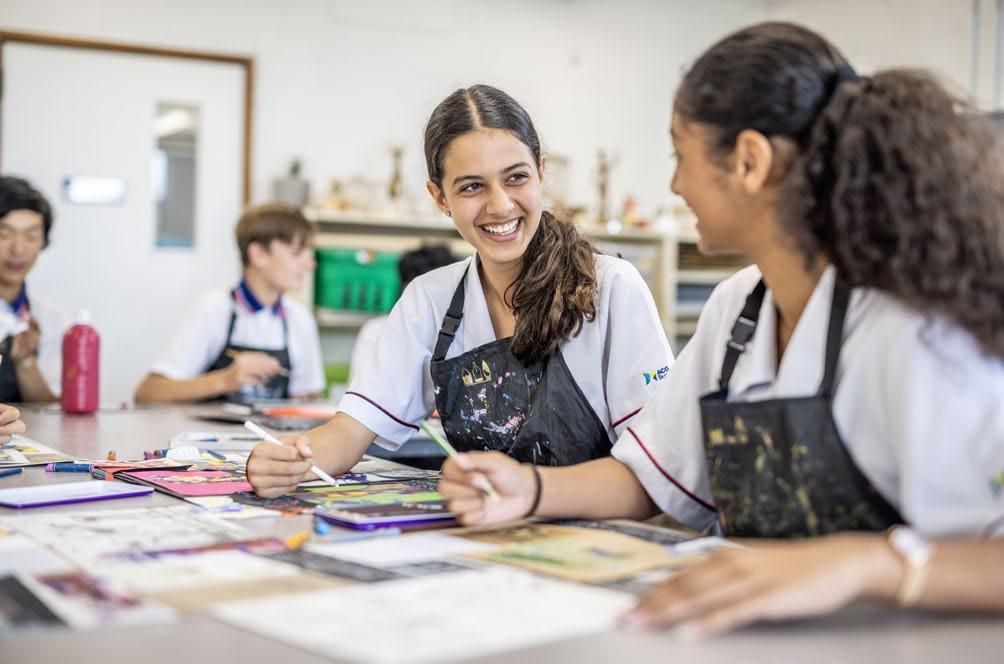
Assessment
Assessment Component 3 - Personal Investigation. Externally assessed. Made up of two integrated elements:
• Practical work and
• Written analysis of between 1000 and 1500 words
50% of the A-Level.
Why choose IGCSE Biology?
Students who enjoy learning about the living world and the complex nature of organisms from the microscopic level to entire ecosystems should consider IGSCE Biology. The course provides an extensive introduction to key biological concepts, while practical investigations provide a backbone to the course.
What does this course lead to?
IGCSE Biology is a prerequisite to study Biology at A Level. This can lead to a multitude of top degree courses such as Medicine, Biochemistry, Pharmacology, Dentistry, Biotechnology and Microbiology.
Course Content
This course provides students with an extensive introduction to a wide variety of concepts covered in Biology and provides an excellent foundation for the study of A Level Biology. The syllabus content covers 21 main topics: Characteristics and classification of living organisms, Organisation of the organism, Movement into and out of cells, Biological molecules, Enzymes, Plant and animal nutrition, Transport in plants and animals, Organisms and their environment, Human influences on ecosystems, Disease and immunity, Gas exchange, Respiration, Excretion, Coordination and response, Drugs, Reproduction, Inheritance, Variation and selection and Biotechnology and Genetic engineering.
Assessment
Students sit either the Core papers comprised of Paper1 (Core Multiple Choice) and Paper 3 (Core Theory) or Extended papers comprised of Paper 2 (Extended Multiple Choice) and Paper 4 (Extended Theory). Both Core and Extended students sit Paper 6 (Alternative to Practical).
Teacher in Charge:

Penny.Gerrard@acgedu.com
Students will require a C grade or above in IGCSE Biology to qualify for the AS Level Biology course. Where does this course lead to?
In addition to undergraduate courses in Biological Sciences at university, an A level in Biology is recommended for Biology-related university degrees including Medicine, Biochemistry, Pharmacology, Dentistry, Biomedical Sciences to name a few.
Course Content
AS Biology covers eleven topics: Cell structure, Biological molecules, Enzymes, Cell membranes and transport, The mitotic cell cycle, Nucleic acids and protein synthesis, Transport in plants and mammals, Gas exchange, Infectious disease and Immunity.
Assessment
Assessment for AS Biology is by external examination. Students sit three papers:
• Paper 1: 1 hour 15 minute, multiple-choice examination which consists of 40 multiple choice questions, all with four options.
• Paper 2: 1 hour 15 minute structured questions examination which consists of a variable number of questions, of variable mark value.
• Paper 3: 2 hour, Advanced Practical Skills examination. This paper requires students to carry out practical work in timed conditions.
“IGCSE Biology provides you with knowledge that is easily transferred to the world around you. Being able to relate what you learn to what you can physically see keeps every lesson engaging, interesting and enjoyable.”
Requirements
Students will require a D grade in AS Biology to qualify for the A2 Biology course.
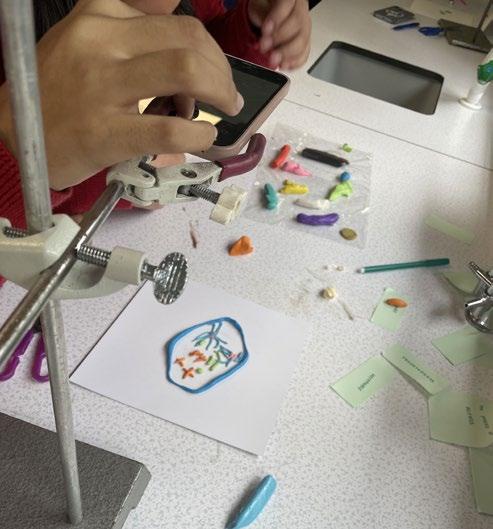
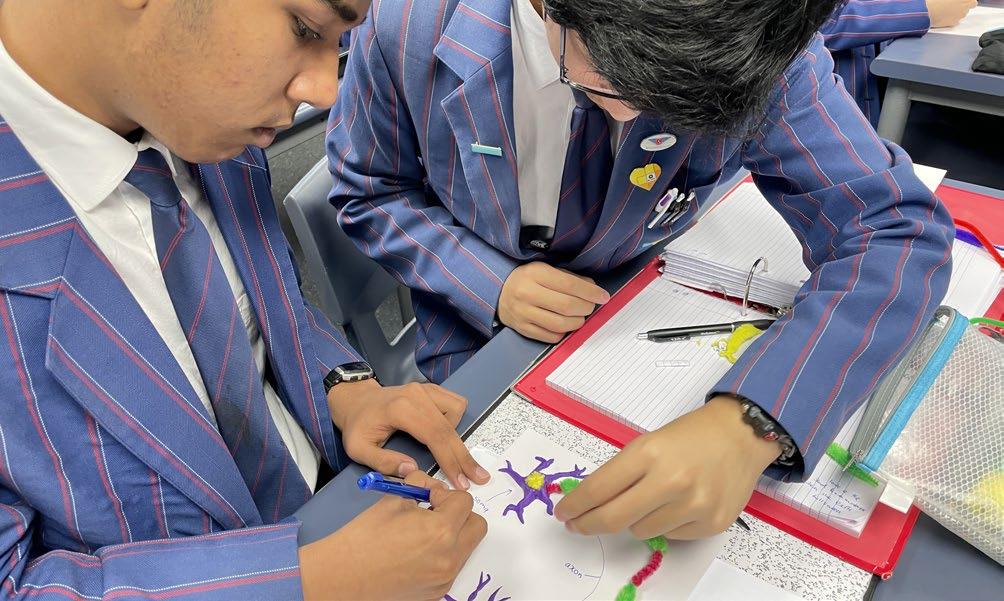
Course Content
A2 Biology covers eight topics: Energy and respiration, Photosynthesis, Homeostasis, Control and coordination, Inheritance, Selection and evolution, Classification, biodiversity and conservation, Genetic technology.
Assessment
Assessment for A2 Biology is by external examination. Students sit two papers:
• Paper 4: 2 hour, structured questions examination. This paper consists of a variable number of structured questions with a variable mark value.
• Paper 5: 1 hour 15 minute, Planning, Analysis and Evaluation examination. This paper consists of a variable number of questions of variable mark value based on the practical skills of planning, analysis and evaluation.
The world in which we live is dominated by businesses, big and small. Business is an exciting and interesting subject which can help you understand today’s world. Businesses are dynamic organisations which reflect the values of society and the people working within them. A study of business will help you gain insight into both. You will learn to recognise the qualities and skills needed to succeed in various aspects of business. You will also be encouraged to consider national and global current affairs critically from a Business perspective.
Not currently offered at IGCSE Level.
Must have a minimum of a C grade average over both papers in IGCSE English and C grade in IGCSE Mathematics.
There are six major themes for the AS Business course:

Business and the Environment, People in Organisations, Marketing, Operations Management, Business Finance, Business Accounting.
Assessment
AS Business is externally assessed. Paper 1 focuses on application of knowledge and understanding and comprises short-answer questions and an essay.
Paper 2 requires students to analyse and evaluate in data response style questions.
 Teacher in Charge: Kim Pollock B.Comm, PGCert. Education Kim.Pollock@acgedu.com
Teacher in Charge: Kim Pollock B.Comm, PGCert. Education Kim.Pollock@acgedu.com

Must have a minimum D grade in AS Business.
A2 Business builds on the six core themes covered in AS Business as well as providing students with an insight into business strategy. Analytical skills become increasingly important in the A2 course and marks are awarded for the candidate’s ability to discuss, evaluate and synthesise the core topics developed in their AS year. Students of A2 Business are introduced to real-life Business case studies and are encouraged to apply their Business knowledge and skills to enquire into and develop informed opinions on these real-life situations.
Assessment
A2 Business is externally assessed. Paper 3 comprises a case study incorporating five questions based on Decision-Making. Paper 4 requires students to complete two Business Strategy essay questions based on a case study.
“Business has been an amazing subject; it has provided me with a clearer outlook on how the world operates.”BSc Hons (Chem.), PGDE (Sc.), MA (Ed.), MEdLd Megan.Davies@acgedu.com

Chemistry is the science of matter. Virtually everything from geological structures to life itself can be expressed in chemical terms. The variety of substances derived from atoms and molecules, which make up the basic framework of nature, is almost limitless. Chemicals are responsible for the huge diversity and ever-changing patterns in the world around us. Today, Chemistry is seen as a fundamental component of the physical, biological and earth sciences. By studying Chemistry, you will begin to understand how to manipulate the material and biological world.
The three assessment objectives in Chemistry are:
a) Knowledge with Understanding.
b) Handling Information and Problem Solving.
c) Experimental Skills and Investigations.
There are twelve different topics that are studied as part of the IGCSE Chemistry course, addressing most aspects of Chemistry, which build on students’ knowledge and skills from previous years. The course also has a strong focus on developing students’ practical skills.
Assessment
Assessment at IGCSE level consists of three examinations. The first paper is a 45-minute multiple-choice paper which counts for 30% of the course, the second paper is the main theory paper which accounts for 50% of the mark and is an hour and fifteen minutes in duration. The third paper may be either a practical paper or an alternative-to-practical theory paper, which assesses students’ practical skills and is worth 20% of the overall mark.
Requirements
Must have a minimum C grade in IGCSE Chemistry. Cambridge International AS Level Chemistry develops a set of transferable skills including handling data, practical problem-solving and applying the scientific method. Learners develop relevant attitudes, such as concern for accuracy and precision, objectivity, integrity, enquiry, initiative and inventiveness. They acquire the essential scientific skills required for progression to further studies or employment.
Universities value learners who have a thorough understanding of key concepts in chemistry, an in-depth knowledge of chemistry’s most important themes and strong practical skills.
The key concepts for AS Level Chemistry are:
• Atoms and forces
• Experiments and evidence
• Patterns in chemical behaviour and reactions
• Chemical bonds
• Energy changes
Assessment
Assessment at AS level involves three separate examinations. Paper One (one hour fifteen minutes) is a multiple-choice test and contributes 31% of the final mark; Paper Two (one hour fifteen minutes) is structured questions and contributes 46% of the final mark; Paper Three (two hours) is a practical examination which contributes 23% of the final mark.
Chemistry is the science of matter. Virtually everything from geological structures to life itself can be expressed in chemical terms.
Requirements
Must have a minimum D grade in AS Chemistry. A2 Chemistry continues the learning from AS Chemistry. The course links back to the previous year’s concepts and extends the knowledge and understanding of each topic, to enable students to develop a holistic view of the course. Content from both years is examinable, so students are expected to have a good understanding of the AS material to be successful within the A2 course.
Students are recommended to have good mathematical skills to be successful in the A2 Chemistry course due to the level of material covered.


Assessment at A2 level involves two examinations. Paper Four (two hours) contributes 77% of the A2 mark. This is the main theory paper covering the whole course of the AS and A2 course. Paper Five (one hour fifteen minutes), which contributes 23% of the A2 mark, is a paper-based practical paper focused on planning, analysis and evaluation.
Students will require a C grade in either IGCSE History or IGCSE English.
Paper 1, Greek Civilisation, studies Alexander the Great, who became king of the small country of Macedonia at the age of 20, fought and defeated armies far larger than his own, and made himself ruler of much of western Asia by the age of 26. We consider different historians and their competing images of the past.

In Paper 2, Roman Civilisation, we focus on one story - Virgil’s “Aeneid” - and look at how Greek tales were being used and reworked to create a nationalistic myth for Augustus’ Rome. We follow the voyage of Aeneas, driven by his destiny to establish Rome, but constantly thwarted by the goddess Juno.

Classical Studies connects to history, art, literature, drama, politics, geography, philosophy, business, law, astronomy, medicine, and more. All sources are studied in English and no knowledge of Greek or Latin is required.
Teacher in Charge: Dr Kerryn Olsen
BA, MA(English), PhD (Eng. & Hist.), PGDip Tchg Kerryn.Olson@acgedu.com
Students will require a D grade in AS level Classical Studies.
Paper 3, Classical History, analyses the social and political aspects of Spartan and Athenian society in the era of the Greco-Persian Wars and the Peloponnesian War. In addition to detailing battles and treaty, it addresses the ideologies and values of these communities, and how those are manifested in everything from daily life to governmental structures.
In Paper 4, Greek Literature, we study Homer’s epic poems, “The Iliad” and “The Odyssey”. Here, we investigate the presentation of different types of heroes, and consider how they interact with the world around them. We also explore Greek culture and society in these texts, and the role which gods and goddesses were understood to play in the fate of the heroes.
“I love exploring the differences in Greek and Roman cultures and influences, and how society has or hasn’t changed since then.”
We live in a world where computer technology surrounds us in nearly every moment of our school, home, and working day. Understanding how that technology works is now considered, by many, a fundamental new literacy. Students who are aware of computer science principles and learn to apply its practices have the power to become creators – not just consumers – of computer technology. We aim to develop our students to be part of the world of the ‘haves’ rather than the ‘have nots’.
We aim to deliver a curriculum that not only provides software and hardware development tools but also develops a computational thinking mindset allowing students to develop technological solutions to a variety of problems.
The topics that are studied in this course are:
• Data representation
• Data transmission
• Hardware
• Software
• The internet and its uses
• Automated and emerging technologies
• Algorithm design and problem-solving
• Programming
• Databases
• Boolean logic
Assessment
The assessment for this course involves two written papers: Paper One - Computer systems; and Paper Two - Algorithms, programming and logic.
Teacher in Charge: Konrad Konlechner

MSc, BSc, GDITE, Dip. Ed. Konrad.Konlechner@acgedu.com
Requirements
Students will require a C grade in IGCSE level Computer Science.
The topics that are covered at the AS level are:
• Information representation
• Communication
• Hardware
• Processor Fundamentals
• System Software
• Security, privacy and data integrity
• Ethics and Ownership
• Databases
• Algorithm Design and Problem-Solving
• Data Types and structures
• Programming
• Software Development
Assessment
Assessment at AS level involves two written papers: Paper 1 Theory Fundamentals and Paper 2 Fundamental Problem-solving and Programming Skills.
“Programming is like a superpower that allows me to bring my ideas to life.”
Requirements
Students will require a D grade in AS level Computer Science.
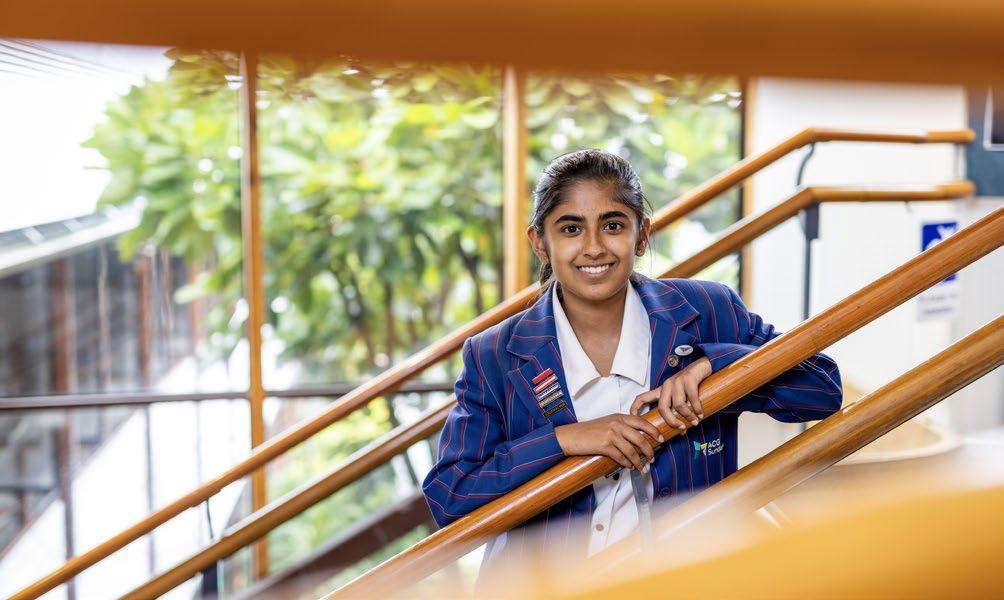
As a continuation of the AS course the topics that are covered are:
• Data Representation
• Communication and internet technologies
• Hardware and Virtual Machines
• System Software
• Security
• Artificial Intelligence (AI)
• Computational thinking and problem solving
• Further Programming
Assessment
Assessment at A level involves one written paper: Paper 3 Advanced Theory, and a practical programming examination: Paper 4 Practical.
“Python is the best language for learning the basics of coding.”
Cambridge IGCSE Design & Technology enables learners to identify, consider and solve problems through creative thinking, planning and design, and by working with different media, materials and tools to produce a made product.
Learners gain technical and design awareness and develop skills such as initiative, resourcefulness, enquiry and ingenuity. They also develop the communication skills central to the design process.
Cambridge IGCSE Design & Technology provides an ideal basis for further study and equips learners with technical knowledge and practical designing and making skills for the world of work.
The aims of this course are to enable students to:
• Develop creative thinking in areas relevant to design and technology.
• Apply problem-solving skills to practical and technological problems.
• Develop the communication skills central to design, realisation and evaluation.
• Gain knowledge and understanding of design and technology.
• Develop skills in research and investigation.
• Design and make products, taking into consideration sustainability and the wider impact on society.
• Develop the ability to make aesthetic, economic, ethical and technical value judgements.
Students will require a C grade in IGCSE level Design & Technology.

This course encourages candidates to be innovative and creative and to develop their ability to design high-quality products. Through their studies, candidates will:
• Develop an awareness of the significance of design and technology to society.
• Learn more about production processes and industrial practices.
• Develop critical evaluation skills which they can employ in a variety of technical, aesthetic, economic, environmental, social and cultural contexts.
As a result, candidates will also become discerning consumers of design and technology, able to make informed choices.
The aims of the Cambridge International AS & A Level Design & Technology course are to enable candidates to develop:
• The ability to be innovative and creative in design and technology and to recognise constraints and produce high-quality products.
• An awareness of the significance of design and technology to society.
• The ability to apply essential knowledge, understanding and skills of design production processes to a range of technological activities and develop an understanding of industrial practices.
• The ability to use information and communications technology (ICT), as appropriate, to enhance their design and technological capability.
“This course has opened my eyes to the world of design and the processes that go into manufacturing the products we use in our day-today lives. It has helped me build problem solving skills and has improved my ability to express my creativity which will better prepare me for a future in various fields - not just design centred ones.”
• Critical evaluation skills in technical, aesthetic, economic, environmental, social and cultural contexts.
• The ability to make informed choices as a discerning consumer.

• Positive attitudes of co-operation and citizenship and the ability to work collaboratively.
Students will require a D grade in AS level Design & Technology.
This course encourages candidates to be innovative and creative and to develop their ability to design high-quality products. Through their studies, candidates will:
• Develop an awareness of the significance of design and technology to society.


• Learn more about production processes and industrial practices.
• Develop critical evaluation skills which they can employ in a variety of technical, aesthetic, economic, environmental, social and cultural contexts.
As a result, candidates will also become discerning consumers of design and technology, able to make informed choices.
The course allows students to develop the ability to communicate clearly, accurately and effectively; learn how to use a wide range of vocabulary, and the correct grammar, spelling and punctuation; develop a personal style and an awareness of the audience being addressed.
Students are also encouraged to read widely, both for their own enjoyment and to further their awareness of the ways in which English can be used. Cambridge IGCSE First Language English also develops more general analysis and communication skills such as synthesis, inference, and the ability to order facts and present opinions effectively.
Cambridge IGCSE Literature (English) enables learners to read, interpret and evaluate texts through the study of literature in English. Learners develop an understanding of literal meaning, relevant contexts and of the deeper themes or attitudes that may be expressed. Through their studies, they learn to recognise and appreciate the ways in which writers use English to achieve a range of effects, and will be able to present an informed, personal response to the material they have studied. Cambridge IGCSE Literature (English) also encourages the exploration of wider and universal issues, promoting learners’ better understanding of themselves and of the world around them.
Successful English Language learners develop an understanding and enjoyment of a wide variety of different texts, both written and spoken. They gain pleasure and awareness of how language works in different ways, for different purposes and for different audiences. In addition, they gain skills for life, including: the ability to appreciate how different texts are shaped by their language and style; skills in creating their own imaginative and persuasive writing for different purposes and audiences; skills in researching, selecting and shaping information from different sources; the ability to analyse and compare written and spoken texts in close detail.
Successful Literature in English learners develop a lifelong understanding and enjoyment of literary texts, and, importantly, gain a range of essential skills, including: the ability to write clearly and effectively; skills in developing arguments; skills in researching and managing information; the ability to analyse complex texts in different forms and styles.
AS Level English General Paper develops a set of transferable skills. These include comprehension, constructing an argument, presenting views, and writing English coherently and persuasively. Learners can apply these skills across a wide range of subjects and these skills equip them well for progression to higher education or directly into employment. It is important to note that this is an AS Level course only, and does not continue into A2.

“I love how studying poetry in greater detail reveals new understandings of the world.”
Requirements
Students will require a D grade in AS level.
The A level course focuses on developing an appreciation of the English Language. Students are required to build upon the knowledge and understanding established at AS Level, concentrating their study on four specialised subject areas: language change; child language acquisition; English in the world; language and the self.

Requirements
Students will require a D grade in AS level.
The A level course focuses on developing an appreciation of English Literature, and will develop interdependent skills of reading, analysis and communication. Students will acquire advanced skills in reading and analysis of literary texts and will be skilled and accomplished in their use of language and terminology.
“A2 Literature has made me a deeper and more critical thinker.”
The IGCSE History course focusses on international relations since 1919. This course includes a general study of twentieth century history including an indepth study of World War One.

Through this course, students have the opportunity to go back in time. They will discover the stories of the past. They will learn about the major events and figures that helped shape the twentieth century and students will learn key concepts in: cause and consequence, change and continuity, and similarity and difference. The students will use this historical evidence as they analyse both textual and visual sources regularly throughout the course.
History helps us to understand people and societies, developing open-mindedness and tolerance. History also teaches analytical thinking and develops reasoning and judgment. By developing these skills, students who study History prepare themselves for future studies in the field of the Humanities, including subjects like Law, Politics and Sociology. Employers often deliberately seek employees with the skills that History teaches.
Through learning about the past, students will find that they are able to better understand the world they live in today.
Teacherin Charge:
Michael Gerrard Bach Soc Sc (Management & Pol Sc), PGCert Ed, PGCert Dig & Coll Learning Michael.Gerrard@acgedu.com
“IGCSE History gives great perspective on the past and teaches you how to apply knowledge to thought provoking questions and discussions in an enjoyable environment.”
“IGCSE History helps develop analytical skills, and understanding of the present world, based on the past. Topics tie in with each other, and every lesson feels like the new chapter of an exciting story.”
As a nation New Zealand is a proud guardian of an extensive range of marine reserves which provide a vital breeding ground for Pacific fauna and flora. A major challenge in the 21st century is to advance the conservation science necessary to provide for the sustainable management of our vast marine realm. To do so we also need a firm scientific foundation to support our Kiwi fisheries and aquaculture industries.
IGCSE level is not offered in 2024 but potentially in 2025.
Students will require a C grade in IGCSE Biology and IGCSE Mathematics.
AS level Marine Science is an exciting interdisciplinary syllabus that studies the biology of the oceans together with the chemical, physical, and geological oceanography. Together this helps us understand the behaviour and interactions of marine life within our oceanic and coastal environments.
1 Water
2 Earth Processes
3 . Marine interactions
4. Biodiversity
5 . Marine Ecosystems

6 Practical skills & Field Trip
Assessment
There are two examinations including structured questions (Paper 1) and data analysis questions (Paper 2).
Teacher in Charge: Jules Robson
BSc Hons (Zoology),
PGDip (Mol. Biology)Jules.Robson@acgedu.com

Students will require a D grade at AS level. The potential of completing the full A level in one year is also available to our top Y13 scholars.
The A2 course builds on the AS knowledge to investigate the physiology of marine organisms, as well as the socio and economic effects of man on the marine environment.
Topics include:
• Physiology of marine organisms
• Energy - Photosynthesis, Chemosynthesis & Respiration
• Fisheries for the future
• Aquaculture,
• Marine Life cycles
• Ocean Acidification & Global warming
• Ecotourism & Conservation
• Data Handling Skills
• Investigative Skills: A2 experiments
Assessment
There are two examinations:
Paper 3: Theory
Paper 4: Data Handling and Investigative skills
“Marine Science is vitally important in today’s world because our oceans play a critical role in helping solve some of the most critical environmental issues we face – feeding our growing population, conserving biodiversity and global warming.”
The study of Mathematics supports learners in building competency, confidence and fluency in their use of techniques and mathematical understanding. This course helps learners to develop a feel for quantity, patterns and relationships. Learners will develop their reasoning, problem-solving and analytical skills in a variety of abstract and real-life contexts. This course provides a strong foundation of mathematical knowledge both for candidates studying mathematics at a higher level and those who will require mathematics to support skills in other subjects. The course is tiered to allow all candidates to achieve and progress in their mathematical studies. Students have the option of choosing from the core or extended program.
Both core and extended courses cover the same topics but to a different depth:
1 . Number
2 Algebra and graphs
3 . Coordinate geometry
4. Geometry
5 Mensuration
6 . Trigonometry
7 Vectors and transformations
8 . Probability
9 Statistics
Students entered for the core course are able to take two written papers: Paper 1 (35%) and Paper 3 (65%). Students who have entered for the extended syllabus are able to take Paper 2 (35%) and Paper 4 (65%).
Students who take the core program are not eligible to transition to the AS level.
Teacher in Charge:
Konrad Konlechner MSc, BSc, GDITE, Dip. Ed. Konrad.Konlechner@acgedu.com
Students will require a C grade in IGCSE level Extended Mathematics.
The subject of Mathematics develops a set of transferable skills. These include the skill of working with mathematical information, as well as the ability to think logically and independently, consider accuracy, model situations mathematically, analyse results and reflect on findings. Learners can apply these skills across a wide range of subjects and the skills equip them well for progression to higher education or directly into employment.
There are a range of options available and at ACG Sunderland we offer the following papers at the AS Level.
Paper 1
1.1 Quadratics
1.2 Functions
1.3 Coordinate geometry
1.4 Circular measure
1.5 Trigonometry
1.6 Series
1.7 Differentiation
1.8 Integration
Paper 5
5.1 Representation of data
5.2 Permutations and combinations
5.3 Probability
5.4 Discrete random variables
5.5 The normal distribution
Assessment at this level is via two written papers. Paper 1 is worth 60% of the final grade and Paper 5 is worth 40%.
Learners will develop their reasoning, problemsolving and analytical skills in a variety of abstract and real-life contexts.
Requirements
Students will require a D grade in AS level Mathematics.
The subject of Mathematics develops a set of transferable skills. These include the skill of working with mathematical information, as well as the ability to think logically and independently, consider accuracy, model situations mathematically, analyse results and reflect on findings. Learners can apply these skills across a wide range of subjects and the skills equip them well for progression to higher education or directly into employment.
There are a range of options available and at ACG Sunderland we offer the following papers at the A Level.
Paper 3
3.1 Algebra
3.2 Logarithmic and exponential functions
3.3 Trigonometry
3.4 Differentiation
3.5 Integration
3.6 Numerical solution of equations
3.7 Vectors
3.8 Differential equations
3.9 Complex numbers
Paper 6
6.1 The Poisson distribution
6.2 Linear combinations of random variables
6.3 Continuous random variables
6.4 Sampling and estimation
6.5 Hypothesis tests
Assessment at this level is via two written papers. As the AS grade is carried over as 50% of the A Level grade Paper 3 is worth 20% of the final grade and Paper 6 is worth 30%.

It is essential that students play an instrument or sing. Having current lessons on their instrument is a must. In addition to this it, is a requirement that students can read and write music notation.
IGCSE Music is designed to provide a broad understanding of Western and World Music.
Students will study pieces from the Baroque, Classical, Romantic and 20th Century time periods. Musical traditions from India, China, Japan, Indonesia, Africa, Latin America, and the Middle East will also be examined.
The practical course work comprises of solo and group performances and composing.
Students will require a C grade in IGCSE level Music.
It is essential that students play an instrument or sing. Lessons on their instrument is a pre-requisite. In addition to this it is a requirement that students can read and write music notation.

AS Music is comprised of two components: practical music and a listening/written paper. In practical music students are required to perform a short concert. They are also required to create substantial compositions.
The written paper focuses on traditions of Western Classical Music, currently it is the performance practices of the Baroque time period. There are Set Works that are studied in detail. These pieces are from the Romantic and 20th Century. They are dramatic and descriptive pieces.
Teacher in Charge: Daniel Patrick O’Connor Bachelor of Music, Bachelor of Education daniel.oconnor@acgedu.comStudents will require a D grade in AS level Music.
A2 Music is a continuation of AS Music. At the A2 Level students need to choose two of the following components: 1) performance; 2) composition; or 3) extended essay. This course is intended to prepare students for Music at the University level. Assessment at this level is via two written papers. As the AS grade is carried over as 50% of the A Level grade Paper 3 is worth 20% of the final grade and Paper 6 is worth 30%.

“Studying the various music styles and techniques from different time periods is fascinating”
“The AS music set work is very interesting.”


“Music at ACG Sunderland captures the essence of musical culture across the world.”
It is a multi-faceted course and provides students with comprehensive knowledge and understanding through both practical and theoretical elements. By selecting this course, students will have the chance to deepen their knowledge and skills in areas such as anatomy and physiology, movement skills, physical training, sports psychology, and more. The course allows students to engage in practical activities, and develop their analytical and critical thinking skills.
Students will have the opportunity to be assessed in a wide varying list of sporting activities to suit their abilities, allowing every student to find something they enjoy and excel in. Activities are able to be chosen from the following categories, Athletic Activities, Fitness Activities, Combat Activities, Dance Activities, Invasion Games, Net/Wall Games, Striking/Fielding Games, Target Activities, Gymnastic Activities, Outdoor and Adventurous Activities, and Swimming
The coursework component requires candidates to complete four physical activities from at least two of seven categories.
Candidates will study the following topics:
• Anatomy and Physiology.
• Health, Fitness, and Training.
• Skill acquisition and Psychology.
• Social, Cultural, and Ethical Influences.
Assessment Practical Coursework Component 50% of the overall final grade.
Written Examination, Theory Component 50% of the overall final grade.
Teacher in Charge: Philip Keen

B Ed (Phys Ed), Grad Dip Tchg & Lrng
Philip.Keen@acgedu.com
Students will require a C grade in IGCSE level Physical Education.
This advanced-level course builds upon the foundations laid in the IGCSE Physical Education course, offering a comprehensive understanding of advanced concepts and principles. By selecting this course, students will have the opportunity to delve into areas such as exercise physiology, biomechanics, sports psychology, and the sociocultural aspects of sport and physical education.
Students will gain an in-depth understanding of the human body’s response to exercise, advanced training principles, and the psychological and sociocultural factors that influence sports performance. Practical activities and analysis will be integral to the course, allowing students to apply their knowledge and refine their skills in a range of sports and physical activities.
This course not only prepares students for studies in sports science, kinesiology, or related fields but also equips them with transferable skills such as critical thinking, research, and effective communication. The coursework component requires performances in two different practical activities chosen from the available selection.
Candidates will study the following topics:
• Applied anatomy, exercise physiology, and biomechanics.
• Skill acquisition.
• Sociocultural influences.
Assessment Practical Coursework Component 50% of the overall final grade.
Written Examination, Theory Component 50% of the overall final grade.
“Physical Education is a chance to develop knowledge about the body and mind, and develop physical skills in individual and team sports. Combining theory with practice, in a way where concepts are clear and engaging; the knowledge acquired from each lesson is easily applied to everyday life”
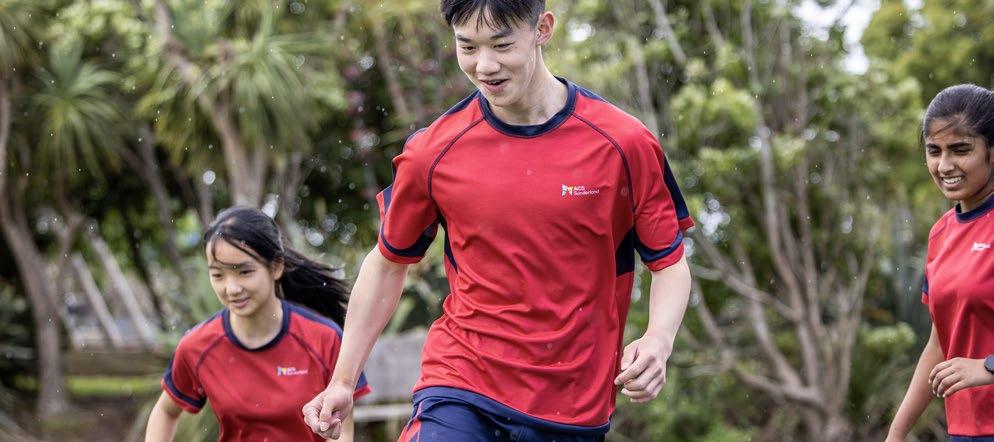
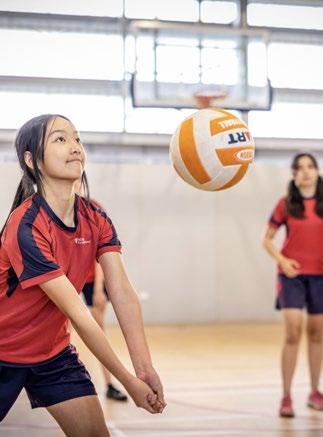
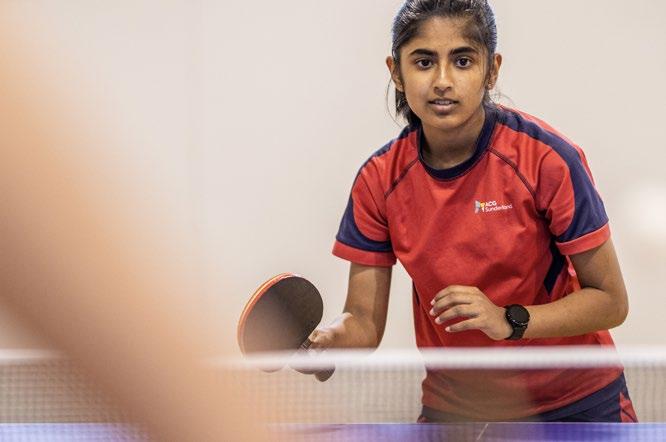
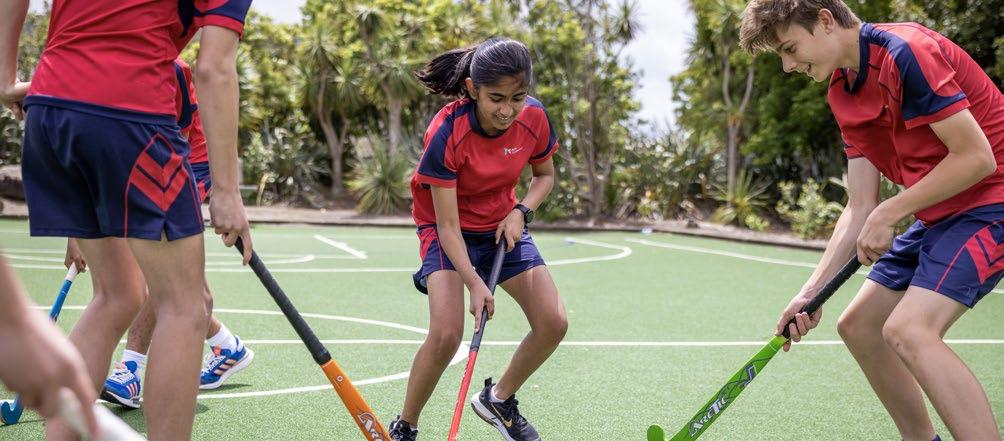
IGCSE Physics develops a set of transferable skills including handling data, practical problem-solving and applying the scientific method. Learners develop relevant attitudes, such as concern for accuracy and precision, objectivity, integrity, enquiry, initiative and inventiveness. Students acquire the essential scientific skills required for progression to further studies or employment.
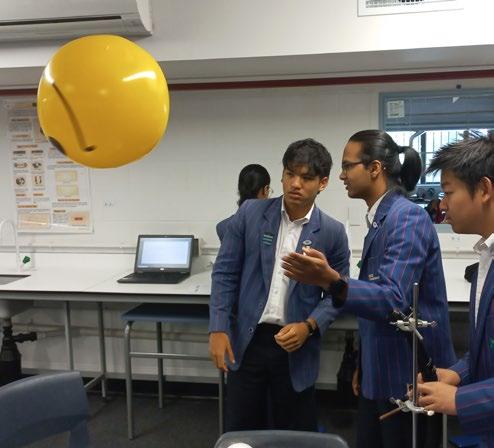
Topics
• Motion, forces and energy
• Thermal physics
• Waves
• Electricity and magnetism
• Nuclear physics
• Space physics
Assessment
Three papers: Multiple Choice, Short Answer and Structured Questions and Practical Test.
Students will require a C grade in IGCSE level Physics.
Key concepts are essential ideas that help develop a deep understanding of Physics and make links between different aspects of the course.
Key concepts for AS & A Level Physics
• Models of physical systems. Physics seeks to understand the behaviour of the Universe. The development of models of physical systems is central. Models simplify, explain and predict how physical systems behave.
Teacher in Charge: Graham Gottard BSc (Physics), PGCert Education Graham.Gottard@acgedu.com

• Testing predictions against evidence. Physical models are usually based on prior observations, their predictions are tested to check that they are consistent with the behaviour of the real world.
• Mathematics as a language and problem-solving tool is integral to physics, it is the language used to express physical principles and models.
• Matter, energy and waves. Everything in the Universe comprises matter and/or energy. Waves are a key mechanism for the transfer of energy, essential to many applications of physics.
• Forces and fields. Matter and energy interact is through forces and fields. The behaviour of the Universe is governed by fundamental forces with different magnitudes and distances, from the very small (quantum and particle physics) to the very large (astronomy and cosmology).
“I enjoy A Level Physics because it not only provides knowledge about the world around us, but it also teaches us to be more aware of our surroundings in the universe and helps us develop strategies to approach problems in real life. Maybe one day I will be sitting on Mars and need to calculate the escape velocity needed to escape into space!”
Three papers: Multiple Choice, Structured Questions, Practical Skills.
Requirements
Students will require a D grade in AS level Physics.

A2 Topics
12 . Motion in a circle
13 Gravitational fields
14. Temperature
15 . Ideal gases
16 Thermodynamics
17 . Oscillations
18 Electric fields
19 . Capacitance
20. Magnetic fields
21 Alternating currents
22 . Quantum physics
23 Nuclear physics
24. Medical physics
25 Astronomy and cosmology
Assessment
Two papers: Structured Questions, Planning, Analysis and Evaluation.
The subject content is organised in five broad topic areas. These provide contexts for the acquisition of vocabulary and the study of grammar and structures. These topic areas enable students to gain an insight into countries and communities where Spanish is spoken. The syllabus gives students opportunities to develop and apply a wide range of foreign language skills. These topics are:
• Everyday activities
• Personal and social life
• The world around us
• The world of work
• The international world
Assessments
Paper 1 - Listening; Paper 2 - Reading; Paper 3Speaking; Paper 4 - Writing
Requirements
Students will require a C grade in IGCSE level Spanish.
The subject content is organised into six topic areas at AS Level. These provide contexts for the acquisition of vocabulary and the study of grammar and structures. These topic areas enable students to progress from the knowledge and skills developed at IGCSE. Students have meaningful opportunities to enhance their language skills through engagement with a variety of texts and application of a wide range of vocabulary and structures. The topic areas listed below:
• Culture
• Health and well-being
Teacher in Charge: Rebecca Lambarth

BA Hons (Spanish & French), Grad Dip Tchg
Rebecca.Lambarth@acgedu.com
• Education and future plans
• Community and society
• Our responsibility for the planet
• Science and technology
Assessments
Paper 1 - Listening; Paper 2 - Reading; Paper 3Speaking; Paper 4 - Writing

Students will require a D grade in AS level Spanish.
The subject content is organised into six topic areas at A2 Level - these are the same as AS Level. The study of these topic areas enables students to progress from the knowledge and skills developed at IGCSE or at AS Level.
This syllabus provides students with meaningful opportunities to enhance language skills. The A Level course includes a range of inspiring literature which has been carefully selected to offer a breadth and depth of literary study and to encourage lively and stimulating classroom discussion.
Throughout the study of literature, learners will be encouraged to develop skills in analysis and interpretation of texts and to give a personal response. Learners will explore the conventions of genres of texts and the contexts in which works have been written, read and received.
Assessments
Paper 1 - Reading; Paper 2 - Writing; Paper 3
- Literature
Candidates cannot carry forward their Cambridge International AS Level Spanish Language (8022) results to the Cambridge International A Level Spanish Language & Literature (9844).
“A Level Spanish has increased my love of the language and culture so much - coming to Spanish class is my favourite part of the day.”
